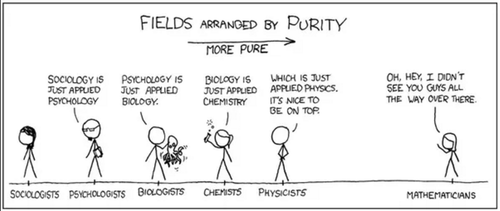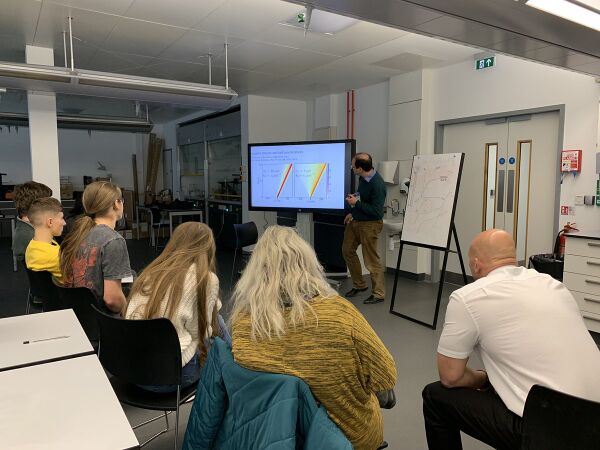Physics Bouts
Physics Bouts are workshops from one-hour to a full-day passing by all timeslots in between where we discuss Physics, either general considerations (What is Physics?, What is Reality?, What can I do as a Physicist?, etc.) or particular topics/activities (Experiments with the inverse square law, experiments on free fall, experiments with oscillators, etc.)
How does Physics approach other Sciences?
(December 2018) for Foundation Year students (all specialties).
On December 3, 2018, in MC438 from 9.00-11.00, Prof. Laussy gave a two-hour (plus questions) presentation of what Physics is and how it relates to other sciences. Refreshments and snacks offered at 9.00, the lecture starts at 9.30. The main audience is any Level-3 University of Wolverhampton student with an interest in sciences in general and physics in particular.

Physics is the most multifaceted discipline of Science. It involves exploring, experimenting and theorising, with all the scientific topics as its playground, from chemistry to engineering passing by astronomy and with something to say about other sister disciplines, such as biology, geology, complex systems (flocks of birds, stock markets, etc.), and just about every topics. A physicist is someone who wants to figure things out. To do so, he/she relies on a broad toolkit, from complex simulations run by computer codes to simple models based on a mathematical idea.
This session will introduce the topics at large and put Physics in perspective of other sciences. It will explain what is the spirit and methods of thinking of a physicist, and how differently other scientists from other disciplines (e.g., a Mathematician, an Engineer) would approach the same problem. At the core of our presentation will be some practical demonstrations, including rotating and falling objects. Everybody with any type of interest in Science, welcome!
How we describe the World around us?
In January 2019, for SciExplore (Year 12) students.
This Session gives a general introduction of what Physics is, and challenges the students with basic problems for the Physicist, such as figuring out if an egg found in the fridge is cooked or not. We then play with momentum and the two equations that capture its linear and angular versions, $\vec p=m\vec v$ and $\vec L=I\vec\omega$. We discuss with this particular case how Physics use such formulas to account for, and sometimes bring to good use through applications (such as launching rockets or detecting rotation), the strange phenomena taking place around us. A final session gives the students the opportunities to confront themselves to an actual student-research question: how should we best measure the period of oscillation of a pendulum to minimize uncertainty?
Experiments in free falls
On 4 April (2019) for Oldbury Wells A-level Physics students.
We welcomed the A-level Physics students from Oldbury Wells for a free-fall session, meaning that we discussed the concepts of things falling in a variety of contexts: gravitation (moon orbiting as it falls), Millikan's droplets, vortices in quantum fluids, etc. We had students run their own experiment and try to compute the terminal velocity of magnetic braking(which is recorded in this blog post). Chloë, our Course-Rep for Level 5, did provide some insights and feedback from the students' perspective.

See also
- https://twitter.com/PhysWlv/status/1113730274892947456
- https://twitter.com/PhysWlv/status/1113776195924111360
The Art of problem solving
We closed the session organized by Dr. Liam Naughton and Andrew Gascoyne to welcome Telford College's students at the University of Wolverhampton. We discussed how Physics is the science of problems solving, given that it also engulfed philosophy in its realm following our understanding of quantum mechanics, and that one cannot limit oneself to the observable universe anymore as far as Physics is concerned. Our Mathematician colleagues, on the other hand, explored combinatorics through towers of Hanoï and programming with fractals.
How we describe the World around us?
This Session gives a general introduction of what Physics—the most fundamental of Sciences—is, and challenges the students with basic problems for the Physicist, such as figuring out if an egg found in the fridge is cooked or not. We then play with momentum and the two equations that capture its linear and angular versions, $\vec p=m\vec v$ and $\vec L=I\vec\omega$. We discuss with these particular cases how Physics use such Mathematical formulas to account for the strange phenomena taking place around us, and transform cryptic mathematical equations into enlightening meaning, with prospects of using one's understanding for applications, such as launching rockets or detecting rotation.
A final paradox easily observed with light will be given to students to ponder on their own, with enough clues given so that the paradox be solved before returning home, but starting from scratch with only the phenomenon itself for those who feel up to confronting the Universe with only their intuition and physical reasoning.
